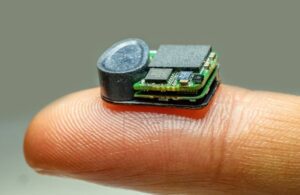
A second-generation version of the wireless neuromodulation implantable mouse stimulator developed at the Feinstein Institutes. (Image from Feinstein Institutes)
Researchers have developed a novel, fully implantable wireless bidirectional vagus nerve stimulation (VNS) and sensing device for mice.
Engineers and researchers at the Institute of Bioelectronic Medicine at The Feinstein Institutes for Medical Research published details about the device and its capabilities in Biosensors and Bioelectronics to emphasize the potential to transform how bioelectronic medicine research is conducted around the world, according to a news release.
The researchers say that early evidence from the use of neurostimulation technology in mice may lead to the discovery of alternative therapies for various chronic diseases, including Crohn’s, rheumatoid arthritis and heart failure.
Institute of Bioelectronic Medicine at The Feinstein Institutes Assistant Professor (and senior author on the paper) Timir Datta and his team designed and built the touted device using only off-the-shelf, commercially available components and 3D-printed parts, ensuring that other researchers can also build and use the system, which was used to apply VNS and sense physiological and neural signals.
“Neuromodulation and bioelectronic medicine hold the potential to treat a variety of diseases without the use of traditional pharmaceuticals and their potential side effects, however, scaling devices to the size needed for studies in mice has been very challenging,” Datta said in the release. “This new device will finally enable the fundamental preclinical studies needed to inform future clinical trials that could lead to potentially revolutionary bioelectronic therapies for patients in need.”
The new device is compatible with different types of electrodes and sensors and has other applications aside from VNS, including deep brain stimulation or pain relief. The device is also wirelessly rechargeable while the mouse remains completely free to move and interact with its environment, allowing researchers to design long-term studies to look at disease treatment progression.
“Basic science in mice is foundational to developing new devices and effective treatments for patients,” Feinstein Institutes President & CEO Dr. Kevin J. Tracey said. “By offering new methods for other labs to use in their neuromodulation work, Dr. Datta and his team are leading the way to new discoveries in neuroimmunology and bioelectronic medicine research.”